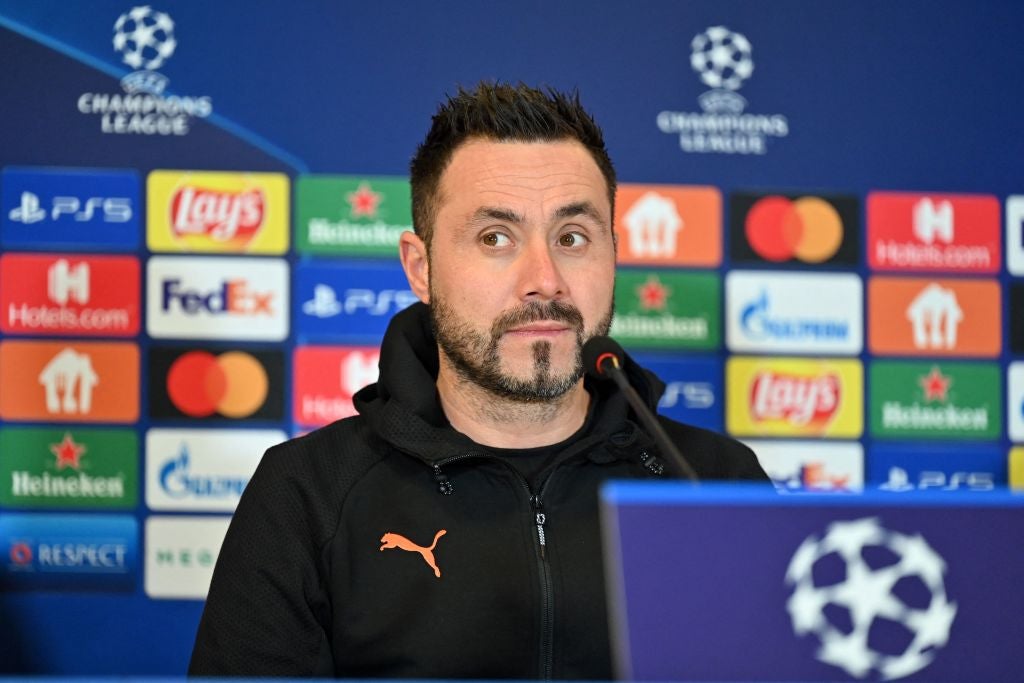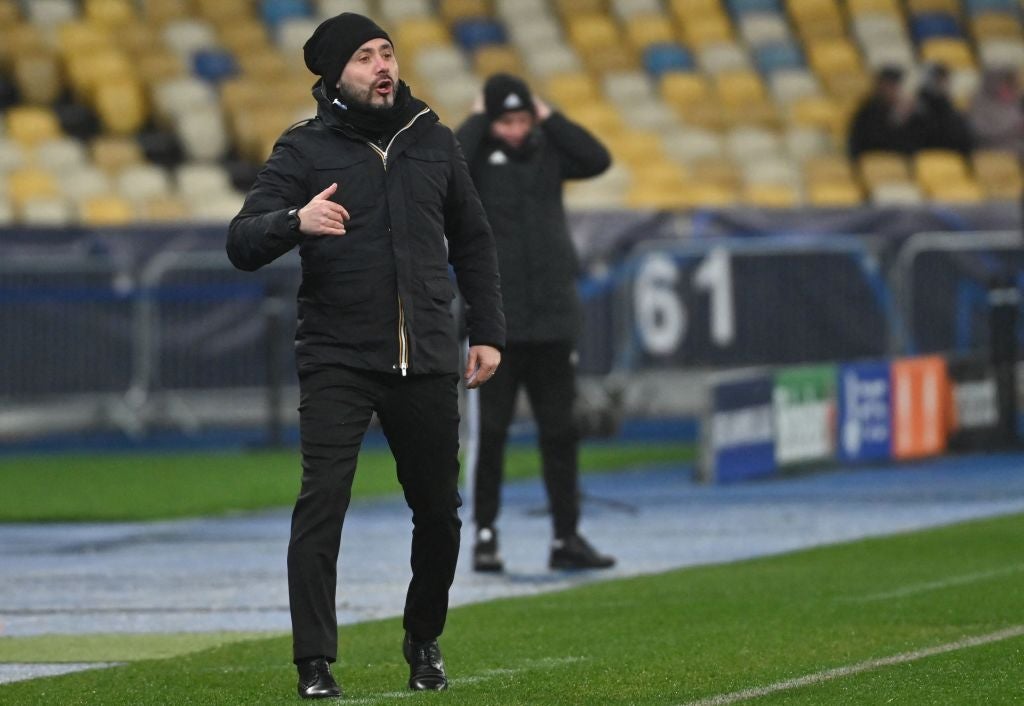Who is new Brighton boss Roberto De Zerbi? Tactics, management style and career so far
The Italian coach takes over after Graham Potter moved to Chelsea, so what should Seagulls fans expect?

Your support helps us to tell the story
From reproductive rights to climate change to Big Tech, The Independent is on the ground when the story is developing. Whether it's investigating the financials of Elon Musk's pro-Trump PAC or producing our latest documentary, 'The A Word', which shines a light on the American women fighting for reproductive rights, we know how important it is to parse out the facts from the messaging.
At such a critical moment in US history, we need reporters on the ground. Your donation allows us to keep sending journalists to speak to both sides of the story.
The Independent is trusted by Americans across the entire political spectrum. And unlike many other quality news outlets, we choose not to lock Americans out of our reporting and analysis with paywalls. We believe quality journalism should be available to everyone, paid for by those who can afford it.
Your support makes all the difference.Possession, patience, penetration from wide areas.
These are all facets of the game Brighton and Hove Albion fans are already well-acquainted with, so it won’t be too much of a surprise to learn that they are notable traits also associated with incoming head coach Roberto De Zerbi.
A couple of others which have not been quite as notable in the Italian boss’s repertoire, so far at least, are protection of the defence and picking up major trophies, but there’s good reason to suspect both could follow in time as he now resumes a career which had been on a decidedly upward trajectory.
The new man at the Amex Stadium is one of Europe’s most tactically exciting and relatively young bosses who opts to coach in the same way he wished to play, albeit with already more success in the dugout than he managed on the pitch.
It’s a fantastically ambitious pick-up by Brighton to succeed Graham Potter, a head coach who perhaps shouldn’t be freely available on the market – and wouldn’t be if not for external factors – and who offers them continuity in some respects, but also a similar risk/reward approach to the club’s own improvement that De Zerbi’s football style has itself habitually carried.
Potter, of course, took the Seagulls from a side battling at the bottom in every sense of the word, to a much more attack-minded, free-flowing team who can mix it with the best on their day. They are still looking to punch above their weight in terms of salary bill and transfer clout, but doing so in a way which makes them an attractive side to watch – or indeed to join.
His replacement is now tasked with doing the same, having left Shakhtar Donetsk earlier this year due to the invasion of Ukraine.
De Zerbi, 43, is a straight-talking and insightful entertainer. He’s absolutely committed to the idea of football as an outlet for both expression and enjoyment and gets his teams playing accordingly... in very quick fashion. Beyond his formative spells with Darfo Boario, Foggia and Palermo – the latter a typically short stint at that club – he impressed with Benevento despite relegation from Serie A, having taken over partway through the 2017/18 campaign.

That summer he then took over at Sassuolo, his three years there yielding plaudits, progression and eventually a move to a side tasked with claiming silverware and regular European action, in Shakhtar.
Upon arriving he made it clear that he would continue his patented style of playing to win through glorious spectacle: “The way to achieve success must be chosen at the beginning of the path,” he said at his unveiling. “It’s clear that victory, success, is the final straight. But as a coach, I must select the path for the team to take. If, for example, you score a set-piece goal or after 20 passes in a row, you can win in both cases, but those are two different ways of achieving success.”
That is what Brighton will now expect, with some differentiation between his style and Potter’s.
De Zerbi has regularly been a 4-2-3-1 coach, favouring possession in deep areas to draw opponents out of shape, then extremely rapid progressions along the ground to move upfield and beyond the first lines of pressure.
It is not uncommon to see his defensive players – very much including the goalkeeper – retain the ball between them for surprisingly long spells, awaiting the chance to find the all-important double-pivot who can take it on the turn and set the team upfield. Inside forwards start touchline-wide and attack in unison, with a No 10 acting both as an aid in progressing possession and as a real scoring threat. Not too much of this is vastly different to Potter’s Brighton – despite an inverted centre-of-the-park triangle for the most part – with even the tendency to push up one full-back into a 3-4-3 or 3-2-5 shape a familiar one by now to Amex regulars during periods of sustained pressure.
Off the ball is where change will be seen.
It’s tough to draw too many conclusions from his cut-short spell in eastern Europe, which lasted just 30 matches from appointment to invasion.

But at Sassuolo, a chaotic and energetic approach to losing the ball could be equal parts exciting to watch, rewarding to get right and costly to be bypassed with.
Fast closing down and aggressive one-on-one challenges in the middle could be beaten by switches of play or long balls behind the midfield, leading to rapid counters and plenty conceded. Defending set plays and crosses was also an issue, especially with too many green and black shirts caught ahead of the ball. That’s all in contrast to the organised lines in place at Brighton over the past year or so; at the time De Zerbi takes over as head coach, the Seagulls have the best defensive record in the Premier League.
As a player, he spent most of his career in the second tier after being a youngster at AC Milan. He was a playmaker, a No 10, but at a time when 4-4-2 reigned supreme throughout much of Europe, with no tolerance for the maverick who was anything less than elite.
Now it’s almost a requirement that top-tier teams have regimented awareness out of possession, well-drilled individuals within a team ecosystem.
It will, therefore, be hugely interesting to watch the development of a trainer who himself acknowledged that he “wears” the same No 10 on his back as a coach that he did as a player. “I don’t want [players as] soldiers,” he said before a Champions League match against Real Madrid last year. “There are 11 people who need another to coordinate them. But on the field the choice of the play, the pass, the dribble, the shot, the occupation of one position to the detriment of another, I want it to correspond 100 per cent to the footballers. Because today in football – and in life – there is much less courage and much less personality than 20 years ago.”
A man who has brought his own personality to the forefront of Italian and European football, more successfully as a manager than he did as a player, will now look to do the same on these shores. Don’t expect it to be dull, whichever way it pans out.


Join our commenting forum
Join thought-provoking conversations, follow other Independent readers and see their replies
Comments